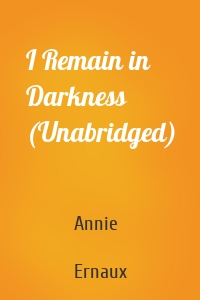Annie Ernaux
10 кн.
Shame (Unabridged)
My father tried to kill my mother one Sunday in June, in the early afternoon begins Shame, the probing story of the twelve-year-old girl who will become the author herself and the single traumatic memory that will echo and resonate throughout her life. With the emotionally rich voice of great fiction and the diamond-sharp analytical eye of a scientist, Annie Ernaux provides a powerful reflection on experience and the power of violent memory to endure through time, to determine the course of a...
| Автор | Annie Ernaux |
A Woman's Story (Unabridged)
Upon her mother's death from Alzheimer's, Annie Ernaux embarks on a daunting journey back through time, as she seeks to «capture the real woman, the one who existed independently from me, born on the outskirts of a small Normandy town, and who died in the geriatric ward of a hospital in the suburbs of Paris.» She explores the bond between mother and daughter, tenuous and unshakable at once, the alienating worlds that separate them, and the inescapable truth that we must lose the ones...
| Автор | Annie Ernaux |
Simple Passion (Unabridged)
In her spare, stark style, Annie Ernaux documents the desires and indignities of a human heart ensnared in an all-consuming passion. Blurring the line between fact and fiction, an unnamed narrator attempts to plot the emotional and physical course of her two-year relationship with a married foreigner where every word, event, and person either provides a connection with her beloved or is subject to her cold indifference. With courage and exactitude, she seeks the truth behind an existence lived...
| Автор | Annie Ernaux |
I Remain in Darkness (Unabridged)
This extraordinary evocation of a grown daughter's attachment to her mother-and of both women's strength and resiliency-recounts Annie's attempt to first help her mother recover from Alzheimer's disease and, then, when that proves futile, bear witness to the older woman's gradual decline and her own experience as a daughter losing a beloved parent. I Remain in Darkness is a new high-water mark for Ernaux, surging with raw emotional power and her sublime ability to use...
| Автор | Annie Ernaux |
The Possession (Unabridged)
Self-regard, in the works of Annie Ernaux, is always an excruciatingly painful and exact process. Here, she revisits the peculiar kind of self-fulfillment possible when we examine ourselves in the aftermath of a love affair, and sometimes, even, through the eyes of the lost beloved.
| Автор | Annie Ernaux |
Exteriors (Unabridged)
In Exteriors, Annie Ernaux concentrates not on the essential details of a relationship with a family member or lover as before but on ephemeral encounters within the larger circle of one's environment and the hundreds of strangers who inhabit it. Here, she captures the feeling of contemporary living on the outskirts of a great city: tortured, chaotic, lyrical, and powerfully alive. Exteriors is, in many ways, the most ecstatic of Ernaux's books, the first in which she appears largely...
| Автор | Annie Ernaux |
A Man's Place (Unabridged)
Barely educated and valued since childhood strictly for his labor, Ernaux's father had grown into a hard, practical man who showed his family little affection. Narrating his slow ascent towards material comfort, Ernaux's cold observation reveals the shame that haunted her father throughout his life. She scrutinizes the importance he attributed to manners and language that came so unnaturally to him as he struggled to provide for his family with a grocery store and cafe in rural France....
| Автор | Annie Ernaux |
Happening (Unabridged)
In 1963, Annie Ernaux, twenty-three and unattached, realizes she is pregnant. Shame arises in her like a plague: Understanding that her pregnancy will mark her and her family as social failures, she knows she cannot keep the child. In a France where abortion was illegal, she attempted, in vain, to self-administer the abortion with a knitting needle. Fearful and desperate, she finally located an abortionist and ended up in a hospital emergency ward where she nearly died. In Happening, Ernaux...
| Автор | Annie Ernaux |
Memòria de noia
És l'estiu de 1958. Lluny, per primera vegada, de la família mentre fa de monitora de colònies, una noia de divuit anys s'endinsa audaçment al món: l'amor i el sexe, el desconcert de ser jove, els remordiments, les ànsies de ser lliure i adult… A Memòria de noia, Annie Ernaux rememora la seva primera nit amb un home, una nit que li deixarà una marca indeleble: durant dècades no es voldrà reconèixer en aquella «noia del 58». Fins que passats més de cinquanta anys es veurà, per...
| Автор | Annie Ernaux |
Els anys
A Els anys, Annie Ernaux construeix una narració personalíssima de sis dècades de la seva vida: dona veu a objectes, cançons, titulars de notícies o anuncis de cada moment històric, intercalant-hi textos del seu diari o la descripció de fotografies familiars. Crea, així, un model singular d'autobiografia, alhora subjectiva i impersonal, alhora privada i col·lectiva, amb un estil tan apassionat com aparentment objectiu. De fet, el fluir del temps és el gran personatge del llibre, en el qual...
| Автор | Annie Ernaux |











